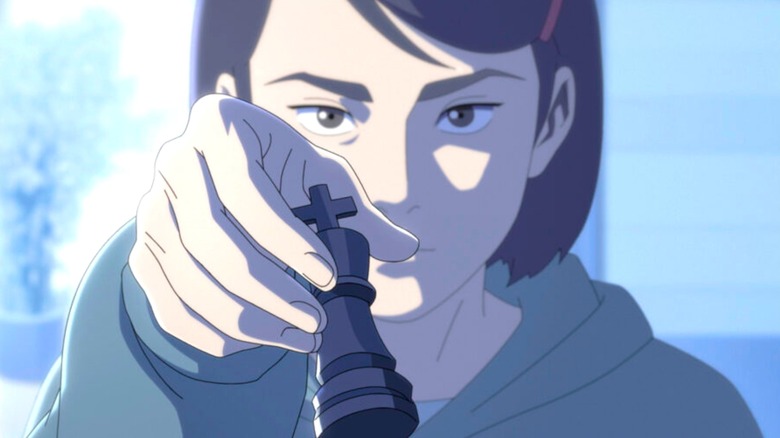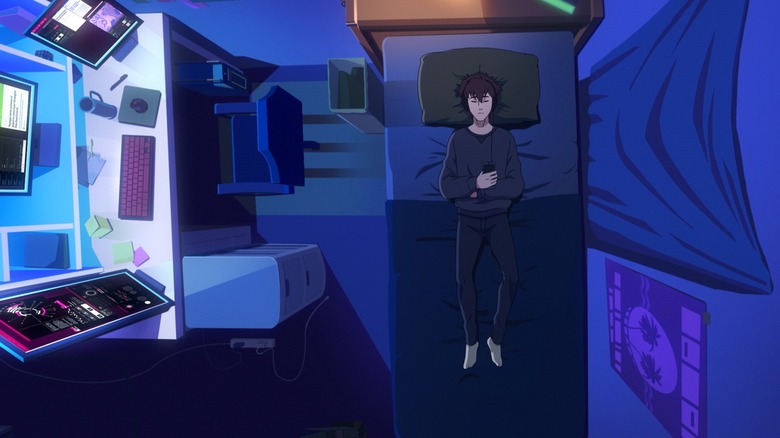Black Mirror Fans Will Love This Chilling Netflix Sci-Fi Series With A Perfect Rotten Tomatoes Score
This post contains spoilers for "Pantheon."
The convoluted relationship between man and machine is often the lifeblood of compelling science fiction. We've seen this play out in varying shades: violent creator-offspring dynamics in "Blade Runner," the encroachment of cybernetics on organic flesh in "Cyberpunk Edgerunners," and the absolute eradication of what makes us human in the technological dystopia of "Texhnolyze." Charlie Brooker's "Black Mirror" explores this concept by reimagining its ethics (or lack thereof), which is part of the reason why the series has been seminal in mainstream discourse since its release. Although newer seasons of "Black Mirror" seem to have lost their spark, it is still a worthwhile anthology that is fashioned like a revamped (and more cynical) take on classic sci-fi like "The Twilight Zone."
If you're looking for something similar in tone or thematic focus, look no further than "Pantheon" (which originally aired on AMC+ and was subsequently moved to Prime Video), the criminally overlooked sci-fi animated series that tackles some really high-concept genre tropes. The age-old question of what it means to be human is at the heart of this story, along with the horror of uploading your consciousness to ensure survival (a concept executed to the bleakest extremes in the video game, "SOMA"). The series follows three distinct protagonists: Maddie (whose deceased father's consciousness has been uploaded without her consent), Caspian (whose gifted nature is the product of being unwittingly raised in a constructed environment), and Vinod (a computer engineer whose mind has been uploaded against his will).
While these three characters lead markedly different lives, they are forced to deal with some form of deception that dehumanizes them beyond recognition. This existential malaise, mixed in with the unsavory connotations connected to unchecked AI and digital consciousness, leads to a streamlined story that pushes established genre themes to their limit. "Pantheon" spends its first season laying a brilliant (and sturdy) foundation (its 100% Rotten Tomatoes score speaks for itself!), and goes all in with its follow-up season, making it an acquired taste for those looking for something more casual and palatable. That said, is "Pantheon" worth your time?
Pantheon etches a topical and terrifying picture of unchecked artificial intelligence
We live in a world that is being rapidly taken over by generative AI in real time. Massive ethical issues aside, the environmental fallout caused by such irresponsible usage is bound to be serious and lasting, leading to a scarcity of resources that we currently take for granted. The problem with generative AI lies in the thoughtless anti-art/anti-life impulse to replace every labor of love with cheap automation, where everything that makes us human is being reduced to a hollow simulacrum devoid of meaning.
"Pantheon" mirrors this dire, hopeless future in vivid and uncomfortable shades, diving straight into concepts like posthumanism and what it means to embody a semi-organic existence. This is contrasted against moments that can only be enjoyed while you're present in your body, such as the simple joy of refilling your coffee cup or gently idling inside a liminal space.
An overreliance on technology to the point of self-erasure can never bode well, and the series explores the intrusive nature of these so-called "smart" integrations with scathing honesty. A piece of technology having access to every piece of information about the user can quickly take a darker turn, and "Pantheon" isn't afraid to show how bleak things can get when the machines take over. Over time, AI achieves technological singularity (a scenario where technological growth outpaces human progress by such a large margin that it becomes unpredictable/unmanageable), creating vast cyberspaces that overwrite any semblance of human sentiment without mercy.
On the flipside, there's potential for beauty and growth when these same spaces are constructed to bolster human relationships instead of hindering or replacing them. Two characters bond inside a co-op video game, transforming this virtual world into a haven for rekindling a relationship that had faded over time. This only goes on to highlight how magical online spaces can be when shaped by human creativity and a tender yearning for community, and how quickly these spaces can turn into digital crypts that are cold and lifeless to behold. "Pantheon" deftly balances these extremities, underlining every possibility that awaits us in the future — this complexity alone should urge us to unpack our unsteady relationship with technology and make better choices before it is too late.
"Pantheon" is currently streaming on Netflix and Crunchyroll.

